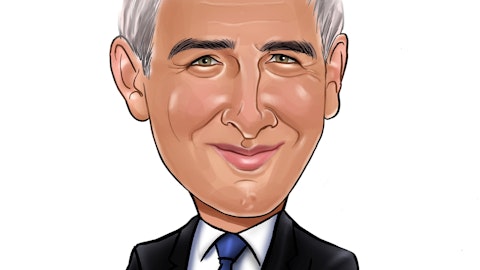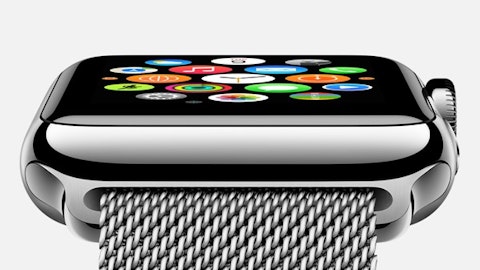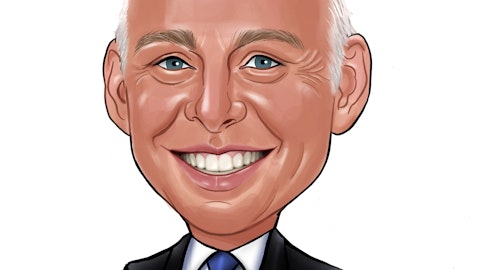After it inched down in pre-market, Hewlett-Packard Company (NYSE:HPQ)’s stock rallied by over 6% in the first trading hours on Friday on the back of the company’s financial results that came mixed compared to estimates. Hewlett-Packard’s adjusted earnings per share amounted to $0.88 in the third quarter of fiscal 2015, which beat the consensus estimate of $0.85. However, its revenue of $25.3 billion for the quarter, was below expectations of $25.44 billion. Revenue also declined from $27.6 billion in the prior-year quarter, dragged down by weak sales in both the consumer and enterprise segments. Sales in the PC business slumped by 13%, while its printer division also saw sales down by 9% on the year. This was the fifteenth quarter of declining revenue reported by the company.
Several analysts have already issued their updates on the stock following the earnings. Among them, FBR & Co. reiterated “Sector Perform” rating, but reduced the price target to $35.00 from $36.00, while Mizuho lowered the price target to $30.00 from $38.00m with a “Neutral” rating.
This was the last financial report of Hewlett-Packard as a whole company. In November, it will split into two separate, publicly-traded firms, with Hewlett-Packard Enterprise operating the enterprise services and data center hardware businesses, while HP Inc. holding the PC and printer businesses. According to the company’s CEO, Meg Whitman, the separation will allow the streamlined businesses to double down on being more nimble in a more competitive business landscape.

However, it should be noted that the restructuring at Hewlett-Packard Company (NYSE:HPQ) is not without its drawbacks. Apart from the troubles the split puts on the firm’s employees, the transaction also implies certain costs, which the company estimates to amount to $2.0 billion. In the third quarter alone, the firm reported $401 million worth of expenses related to the split.
Nevertheless, the news about Hewlett-Packard Company (NYSE:HPQ)’s split has attracted more interest from hedge funds, as our data show. We follow hedge fund sentiment regarding stocks like HP, because despite the general opinion that hedge funds underperform the market based on net returns, they are very skilled at picking individual stocks. However, hedge funds’ best-performing picks are the small-cap stocks they invest in, but they cannot take large enough positions in them relative to their portfolios to generate strong overall returns. We share the top 15 small-cap stocks favored by the best hedge fund managers every quarter and this strategy has managed to outperform the S&P 500 every year since it was launched in August 2012, returning 123.1% and beating the market by more than 65 percentage points (read more details).
In this way, smart money are bullish on Hewlett-Packard, betting that its split will generate more value for shareholders. According to our database, the number of funds that had long positions in Hewlett-Packard remained unchanged at the end of the second quarter, but the aggregate value of their holdings went up by 10% on the quarter to $3.12 billion, while the stock lost around 4% during the same period. Moreover, at the end of June, investors that we track held 5.8% of Hewlett-Packard’s outstanding shares.
More specifically, Richard S. Pzena’s Pzena Investment Management holds the largest stake in Hewlett-Packard Company (NYSE:HPQ), which contains 18 million shares as of the end of June. Clint Carlson’s Carlson Capital initiated a stake in HP during the second quarter, disclosing 722,300 shares, while Steve Cohen’s Point72 Asset Management reported a new position, which contains 642,000 shares, in their latest 13F filings.
However, since the number of funds bullish on HP remained unchanged during the second quarter, a number of investors unloaded their entire positions. Among them is Tony Chedraoui’s Tyrus Capital, which sold out its entire stake that previously contained around 1.98 million shares.
Disclosure: None




